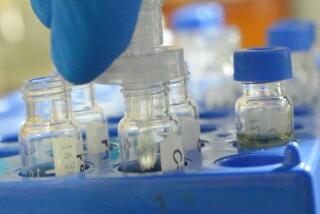Lora’s Second Drug Test Negative : State Commission Still May Seek Sanctions Against Boxer
- Share via
A second urine sample taken from boxer Miguel Lora after his Aug. 1 world championship bout at the Forum tested negative Friday, but the California Athletic Commission is still expected to seek sanctions against the Colombian boxer.
Lora, who defeated Albert Davila of Pomona on a unanimous decision for the World Boxing Council bantamweight championship, tested positive for amphetamines in an Aug. 4 test.
Despite the second lab report, it’s expected that Lora still faces action by the athletic commission when it meets Friday in San Diego.
Lora has generated more attention from his lab urine samples than from anything he did in the ring, when he won an easy, 12-round verdict over Davila. During the bout, Prime Ticket television commentator Ruben Castillo saw Lora ingesting a substance from a paper packet between the fifth and sixth rounds.
Athletic commission officer Marty Denkin ordered the packets found in Lora’s corner confiscated, along with two water bottles containing “sweet-tasting” water.
Commission rules allow boxers to drink only plain water during a fight. Lab tests of the water and packets showed them to contain sucrose, and Denkin said that Lora faces possible sanctions for that infraction.
However, after the lab test of Lora’s first urine sample showed positive for amphetamines, Denkin said: “This is now very serious. Before, we could deal (routinely) with the sucrose . . . Now we’re talking about narcotics.”
After the fight, two urine samples were taken from each fighter.
“We had two very small urine samples from each boxer, and that was difficult because both boxers were dehydrated,” explained Dr. Robert Karns, the commission’s attending physician.
“The fact that amphetamines would show in the first lab report and not in the second would be an expected result, under the circumstances.
“Unless you freeze-dry the specimen, over an 11-day period it would be common for substances such as amphetamines to undergo normal degeneration, and also to undergo destruction by bacteria in the urine.”
Dr. Daniel Chan of the Central Diagnostic Laboratory in Tarzana agreed. He said several factors would determine how long amphetamines remain in an unfrozen urine sample.
“First, the amount of amphetamines is important,” he said. “If you’re dealing with a high level, it would tend to last longer.
“And the amount of bacteria in the urine is another factor. The composition of various elements in the urine would also be a factor, such as the acid level.”
Lora’s first sample exam was made at Central Diagnostic Laboratory. But the second, under WBC direction, was at UCLA Medical Center.
“Under WBC rules, in the event a first test is positive for a banned substance, the WBC supervises the testing of the second urine sample,” said Denkin, in explaining why the same lab didn’t perform both tests.
“We wanted the same lab to make the test, but Jose Sulaiman (WBC president) wanted us to take it to UCLA.”
When Lora was contacted by California Athletic Commission executive director Ken Gray after the first urine sample tested positive, Lora said he took only a prescribed cold medication 25 days before the fight.
Friday’s UCLA lab test did show traces of PTH, a banned substance found in some cold medicines.
Denkin said Friday he still believes one of four things will happen to Lora at the Friday commission meeting:
--Lora retains his title but is given secondary sanctions, such as a fine and/or suspension. --The bout is declared a no-contest, and the commission recommends to the WBC that a rematch be ordered.
--Lora is disqualified, and the title is awarded to Davila.
--The matter is referred entirely to the WBC.
“I’ve talked to the lab people who performed the first test, the positive one, and they stand behind it 100%,” Denkin said.
It was also learned Friday that an irregularity during the taking of the urine samples on Aug. 1 could throw all four urine samples into question.
The commission inspector, Denkin said, inadvertently failed to have either boxer sign his sealed samples, although Denkin said the samples were identified correctly. He said the inspector and attending physician, Karns, signed them.
It was also learned that a $500 fine was taken out of Lora’s $75,000 purse for showing up late for the fight.
“Normally, we require boxers to be in the arena at 5 p.m.,” Denkin said. “Lora’s people asked for an extension at the rules meeting, so we allowed them 6 p.m. He didn’t show up until 7:30 p.m.”
The fight began at about 9:40 p.m.
More to Read
Go beyond the scoreboard
Get the latest on L.A.'s teams in the daily Sports Report newsletter.
You may occasionally receive promotional content from the Los Angeles Times.










